
CooKit Use and Marketing Taught in Burkina Faso
Prior to development of the CooKit some years back, I had been working in Africa and using a solar box cooker. But while my daughter was working in Gorom-Gorom, a village in the northern Sahelian part of Burkina Faso, I decided to give the CooKit a try.
I ordered two of them from SCI and tested them out while staying with her in 1996. The CooKits worked well and generated lots of curiosity and interest, so I ordered more for my second stay in Gorom-Gorom in 1997. During that stay I worked with a group of 20 women to experiment cooking local dishes. There, the staple food is millet broth, which is prepared in big 10-liter cooking pots over a wood fire with frequent stirring. Of course the stirring is to prevent burning, but it is also said to make the dish more airy.
The group found solar-cooked broth unsatisfactory, but thoroughly enjoyed, amongst other things, solar-cooked rice, chicken, sauces, groundnuts, and tuber crops like sweet potatoes, yams and cassavas. Upon return to Holland we created the foundation KoZon, which means cooking with sunshine, to raise funds for projects.
Acquiring funds in the Netherlands for solar cooker projects is not easy, as this is a rainy country where clear, sunny days are the exception, so solar cooking enthusiasts are uncommon. To make things worse, a very influential appropriate technology organization had some negative experiences in the early days with parabolic cookers, and thus continues to discourage those wanting to start solar cooking projects in developing countries. Another drawback in Holland is that it is difficult to find manufacturers willing to produce foiled cardboard, of which the CooKit is made. This is because cardboard recycling is very popular and foiled cardboard cannot be recycled without removing the foil first.
In the end, volunteers helped us to glue foil to 300 pieces of cardboard which were then mechanically die-cut for us in the form of the original Nairobi CooKit (slightly different from the California model). Of course the CooKits should be produced locally in Burkina Faso, but only one packing factory exists there, and its cardboard is purchased from Côte d’Ivoire – resulting in costs approaching US $2 for the cardboard alone, without foil or cutting. They also do not have a machine to glue foil to the cardboard.
KoZon hoped to commission a study by a local consultant to find out where CooKits could be produced for a reasonable price, whether in Burkina Faso, Mali, Côte d’Ivoire or Ghana, but does not have the funds to pay for such a study. We are now trying to find other ways to obtain this goal.
The 300 hand-glued CooKits were mailed to Burkina Faso in 1999. Two-day demonstrations were given by six of the women recruited from those who were given a CooKit in 1997. Cooking was taught the first day, while the second day was a mixture of cooking instruction and lessons in marketing and selling CooKits. The demonstrations were given in six different neighborhoods of the village. As a lot of single men bought CooKits, we had one demonstration exclusively for bachelors. CooKits were sold with a black pot, two polyethylene bags and a cotton storage bag for 1500 CFAF (around US $2.50). With a pot and bags included this was a very reasonable price, a price that poorer women could afford to pay. They understood, however, that it was a subsidized price. The demand was great, and within 18 days all 300 CooKits were sold. Follow-up visits are conducted to assess the usefulness of a cooker – how often is it used, what is cooked, etc.
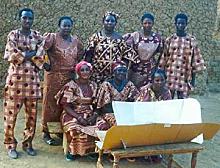 The training team |
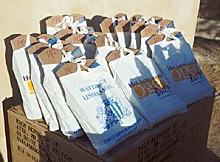 Packaged CooKits ready for sale |
When I visited in April of this year I discovered that, unfortunately, therehad been many dusty, low radiation days – resulting in fewer days when the CooKit was effective. While there we helped start the local, hand-crafted production of CooKits and hay boxes (an insulated pot-holding device, previously unknown to the villagers, that allows cooking to continue after a pot is removed from its heat source).
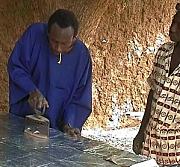 Foil being applied by hand |
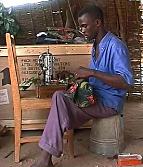 A tailor sewing the insulating hay box lining |
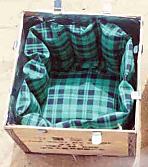 Interior of a finished hay box |
In Holland we have now found a factory that is willing to make CooKits for us, but until production is realized, we will continue to produce them by hand. Contact: Wietske A. Jongbloed, Hollandseweg 384, 6705 BE Wageningen, Netherlands. Tel: 0317 412370, fax: 0317 410732, email: wiewen@bart.nl



